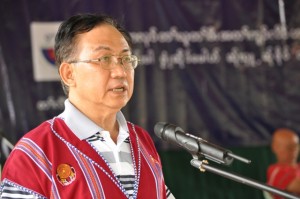Padoh Kwe Htoo Win, the Karen National Union’s general secretary, in an exclusive interview with Karen News explains his organization position on the peace process with the Burma government, repatriation of refugees and land ownership. In part one of a three part series Padoh Kwe Htoo Win talks about the peace process.
 Padoh Kwe Htoo Win said that despite three rounds of peace talks have been held with government representatives there is still a long way to go.
Padoh Kwe Htoo Win said that despite three rounds of peace talks have been held with government representatives there is still a long way to go.
“We’ve only reached preliminary agreements from these talks. In terms of agreement related to a ceasefire code of conduct we’ve only reached a draft stage – in other words an agreement in ‘principle’. Since our last talks in September 2012, there hasn’t been any follow up meetings to have a concrete agreement on the ceasefire code of conduct that both armed groups need to follow.”
Padoh Kwe Htoo Win explained that there is still goodwill between the two sides.
“We have communication and contact with each other in preparing for the next round of official talks. Since there hasn’t been any concrete agreement on defined territories for both sides, there are still misunderstandings between us. The root cause of the misunderstandings is due to what happened [between us] in the past.”
Padoh Kwe Htoo Win stressed that it was essential to build trust between the government and KNU peace builders and to move on to the next phase.
“We have to build trust through further cooperation, we are prepared to meet to have concrete agreement on the ceasefire and get to the stage where the ceasefire code of conduct is agreed to and followed through. We’ve kept our ceasefire agreement, although we haven’t had a concrete agreed to code of conduct – we could say that there is no fighting between us except for a few clashes in some area.”
Padoh Kwe Htoo Win pointed out that a code-of-conduct for the Burma Army and the Karen National Liberation Army was a priority to ensure both sets of soldiers operated to an agreed set of rules.
“To get a concrete ceasefire agreement, we need to agree on the ceasefire code of conduct. The first priority will be to get agreement to have a concrete ceasefire. The second thing we need to discuss is that during the ceasefire, there are problems in our controlled area – the government is trying to establish its administrations – this causes disturbance to peace building. We still don’t have full trust in each other, actions like trying to build up influence seems dishonest to us or seems like [the government] is trying to have more influence over [our] territory is causing doubts for our organization and our civilians. Since there is little or no fighting, we need to talk about economic and development issues in our area.”
Padoh Kwe Htoo Win said he understands that Burma needs development – roads, electricity and health care facilities, but as international humanitarian groups have pointed out these projects have to be for the benefit of communities, that there has to be impact assessments carried out before they start and the rule of law has to be observed.
“Our [KNU] view is that by having a ceasefire and building peace in the country it will help solve political problems, but at the same time, we need to carry out development projects such as rebuilding local communities. For these mega economic development projects, we need to think and discuss with the government.”
Padoh Kwe Htoo summarized that the next round of peace talks between the government and the KNU will include discussions on a concrete ceasefire agreement, problems related to regional administration and economic issues.
“This stage of ceasefire is only for us to stop fighting each other. During the time when we were fighting each other, we always looked for ways to win against each other – how to destroy or how to kill. When we made the ceasefire, we had to stop fighting and to try to build trust between us.”
Padoh Kwe Htoo Win admits that there is still a lack of trust between the KNU and the Burma government and to have a code of conduct for both sides is important.
“We don’t have full trust between us, we have to move forward slowly. We need to show our willingness to stop fighting each other. Rules and regulations must come first. To stop the fighting and our aggression, we need to set rules and regulations to make sure that our actions that could cause fighting or hatred are minimized.”
Padoh Kwe Htoo Win points out that Karen villagers are concerned that despite a ceasefire agreement Burma Army soldiers have not yet withdrawn.
“We must [think] about the relocation of troops [Burma Army] away from those areas that are a threat to the livelihood and the security of villagers. All this will have to follow after the [ceasefire] code of conduct has been agreed to.”



